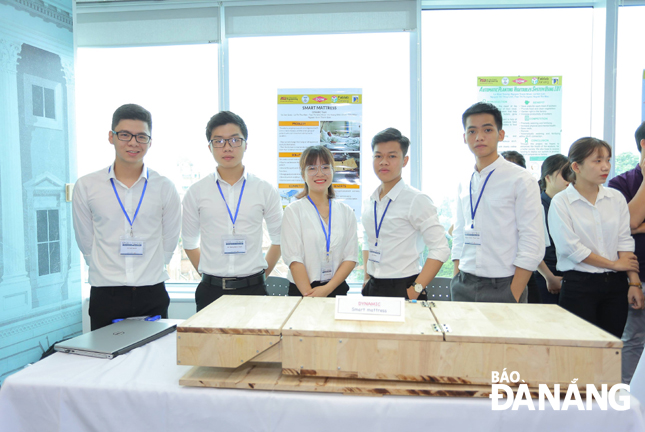Students' creation benefits those with reduced mobility
A group of talented students from the Da Nang University of Science and Technology have won the national-level Engineering Projects in the Community Service (EPICS) programme which took place in June. Their creation is a smart mattress assisting patients with reduced mobility in changing posture and direction.
 |
| The talented students with their creation |
Their product is the joint brainchild of the students, namely Vo Van Quoc, Dinh Nhan, Nguyen Quoc Thanh Giang, Hoang Minh Chinh, Le Thi Thu Huyen and Tran Thi Minh Khue.
As the first step to develop this product, the students conducted a survey of the elderly with joint or bone disease, and patients who had lost movement due to accidents were receiving treatment at 2 local hospitals.
The patients’ relatives had to stay with them at all times to take care of them and help them move.
One of the creators, Vo Van Quoc, a second year student from the Mechanical Engineering Faculty, eagerly remarked the 2m-long smart mattress, which allows those with reduced mobility to move without assistance from others.
In detail, this product can rotate a figure 180 degrees, lift the upper and lower body parts in a flexible and easy manner via only a small control device.
Quoc added that it is a pity that many scientific and technological innovation loving students usually show their keen interest in creating something they really like rather than wondering whether or not they satisfy certain demands in real life.
In order to avoid this issue, Quoc has joined force with his friends to create the mattress based on the real demand of those with reduced mobility. Thanks to this, these talented students made their dream come true as their product has received high praise from the public for its high practical significance.
EPICS was founded in 1995 at Purdue University by Professors Edward Coyle and Leah Jamieson as a solution to two problems.
First, many engineering graduates lacked real world skills need for project development, such as budgeting and scheduling. Second, many non-profit organisations did not have funding for needed professional engineering services to design displays and exhibits, or keep relevant databases.
The solution was to use the skills of undergraduate students through the curriculum to provide services to local non-profit organisations.
The EPICS programme in Viet Nam was launched by USAID’s Building University-Industry Learning and Development through Innovation and Technology Alliance, Arizona State University, and Dow Chemical Company.
The programme is an internationally recognised multi-disciplinary, social entrepreneurship challenge that helps students from aspects of science, technology, engineering, and mathematics develop a collaborative mindset and technical skills to brainstorm, design, prototype, and test their engineering-based solutions for local challenges.
A total of 4 Vietnamese universities have been selected to pilot the programme, namely the Da Nang University of Science and Technology, the University of Technology and the Industrial University, both based in Ho Chi Minh City, and the Dong Nai Province-based Lac Hong University.